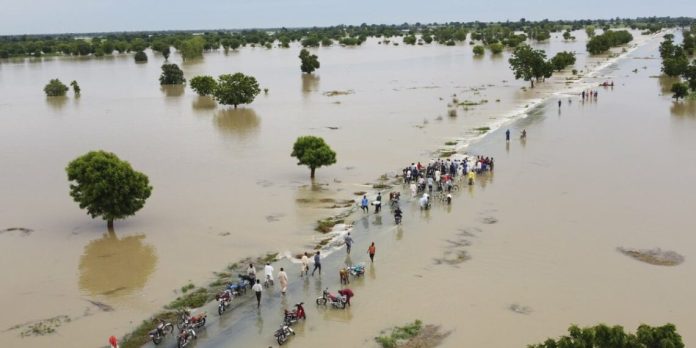Vice President Kashim Shettima has said an assessment of the World Bank Global Rapid Post-disaster Damage Estimation put the total direct economic damage to infrastructure as a result of the 2022 floods to be about $7 billion.
According to him, Nigeria is gravely impacted by the negative effects of climate change.
Shettima said this at the one-day workshop organised by the National Council on Climate Change with the theme “Unpacking the outcomes of the fifty-eight sessions of the subsidiary bodies of the United Nations framework convention on climate change.”
Shettima, who was represented by his Deputy Chief of Staff, Senator Ibrahim Hassan said, “Even as a developing nation in the global south, Nigeria is gravely impacted by the negative effects of climate change. For instance, Nigeria is ranked as one of the ten most vulnerable countries to the impacts of climate change in the world. This is despite our negligible contribution to overall global carbon emissions responsible for climate change. In fact, Africa as a whole, accounts for less than four per cent of total global Carbon emissions.
“For me and a lot of the people that come from the North Eastern part of Nigeria, we bear the scars of climate change effects and have had to live with its impacts, such as drought and desertification, disruption of rainfall patterns, leading to sandstorms, severe floods, destruction of farmlands, infrastructure, and human settlements. These and many more occur in other parts of the country too.
“We are all living witnesses to the ravaging floods of 2022 which held the country to a standstill for days. The World Bank’s Global Rapid Post-disaster Damage Estimation assessment put the total direct economic damage to infrastructure to be about $7 billion. This is equivalent to 1.6 per cent of Nigeria’s estimated 2021 Gross Domestic Product, not including loss of over 600 lives. For Nigeria, that was climate change at its worst.”
He, however, said the NCCC was directed to develop a Comprehensive Climate Change Adaptation Project for Flood Management in Nigeria to avert future occurrences, and the project should include resuscitation of the Lake Chad Basin.
“Nigeria has shown great leadership in Africa and has played a critical role in the UNFCCC climate policy negotiation process, consistently advocating for a just and fair process in addressing climate change since it became a Party to the UNFCCC in 1994. In 2015, Nigeria joined the global community in adopting the Paris Agreement, the first binding mechanism for all countries towards addressing the challenges of climate change in keeping faith with the target of limiting the increase in global temperature within 1.5oC.
“Nationally Determined Contributions are at the heart of the Paris Agreement and the achievement of its long-term goals. In its first NDC, Nigeria, in 2015, pledged an unconditional 20 per cent reduction on Business-As-Usual emissions, and a 45 per cent conditional commitment by 2030.
“In 2021, Nigeria updated its NDC, maintaining the commitment to an unconditional 20 per cent reduction below Business-As-Usual emissions, while increasing the target for its conditional commitment from 45 per cent to 47 per cent below BAU emissions by 2030. In addition, Nigeria committed to achieving Net Zero Carbon emissions by 2060.”
The Vice President noted that a Climate Change Act (2021) was signed to address the adverse impacts of climate change and foster effective implementation of climate change activities under the NDC.
“The Act also provides an all-inclusive regulatory and legal framework for achieving Nigeria’s long-term climate goals, which include net zero carbon emissions by 2060, adequate climate financing, as well as ensuring environmental and economic sustainability.
“The Act further establishes the National Council on Climate Change, chaired by His Excellency, the President, while His Excellency, the Vice President is its Vice Chairman. The Council includes Ministerial membership across priority sectors of the economy and is administered by a Secretariat,” he added.


